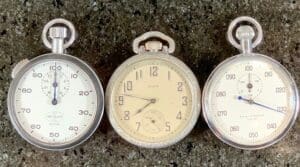
Timing is a special skill you have to master if you want to entertain guests with a sit down dinner. I quickly learned that knowing how to cook something was only half the battle. To master timing you need three things.
A. Knowledge
B. Experience, and
C. Planning
Let’s back up, and I’ll explain what I mean by timing and why it’s important. All the elements of a dinner course, the main and sides must be ready to serve together. That’s timing. Ready to serve different courses without too little or too much time between them. That’s timing.
How do we master this? We break it down to learn our A.B.C.’s.
Remember that every element, course and guest you add compounds the difficulty. Like the difference in caring for one child vs. two, it’s not arithmetic, it’s exponential. I have major respect for the professionals that do this for a living. From a diner’s perspective they make it look effortless.
Knowledge
You aren’t required to have the intellect or encyclopedic learnings of jeopardy champion James Holzhauer. You know your limitations and sadly not everyone can make a smooth hollandaise, silky custard or perfect risotto, so stick to what you can do. That’s knowledge. How to cook your dish well enough to understand exactly how long it takes from start to finish, that’s knowledge.
Experience
Practicing your recipe is the only way you will know how to make it successfully time after time. That will steady your hand when you’re under pressure to make it for guests.
Practicing is how great restaurants make it look easy. You don’t think the chef wakes up in the morning, having dreamt of a new dish and serves it at dinner that evening, do you?
Planning
I consider planning the most important of these three tenets. The good news is, there are no mad skills required. Anyone can plan. It’s only a matter of having the want-to. In fact, it’s another thing the professionals do so much better than we home cooks. Not long ago I agreed to cook a seven course french dinner for a visiting guest and local friends. I’m going to share what I learned doing that.
Date and Time
This determines everything, when to order ingredients, shop and cook. It all flows backward from there.
The Menu
Easily the most critical decision. The availability of ingredients, the difficulty of preparation and whether any step of the process can be completed in advance will affect your outcome. The sequence of courses and the intensity of preparation, particularly if you want to dine with your guests, is particularly important. Ask your self these questions:
- Are ingredients readily available or will some have to be ordered in advance?
- Can a recipe be prepared in advance without sacrificing quality?
- Can a recipe be broken down and partially prepared in advance?
- Do you plan to serve a new recipe?
Test any new recipe, to make sure it’s guest worthy. Learn how long it really takes and what tricks are necessary to bring it together.
Remember that every, little, thing, you can do before the dinner means more fun for you! That’s why we do this, right?
Strategery?
One of our former Presidents famously said, multi-course meals require “strategery”. Here are some tips.
- Alternate courses that must be cooked “live”, with those made in advance
- Make soups a day or more in advance because they will taste better!
- The same goes for ice cream, sorbets and many dips or sauces
- Cut and chop ingredients, seal in airtight containers and store in the fridge
- Pre-measure spices and herbs, combine them when possible for each individual dish
- Many desserts, cakes and pies can be made in advance and only need to be portioned
- Aperitifs and some cocktails can be mixed in advance and stored, then chilled and poured on demand
- Rope a guest into helping because everybody can use a sous-chef!
Judgement Day
No, this isn’t where you meet your maker, but be aware of the stakes. Your guests will have a scorecard in their mind as they experience each dish. This is where it all comes together and we want a score of 10!
And just one more thing…
David Chang said the biggest mistake made by home cooks is failing to practice mis-en-place. Don’t be one of those people! Plan, measure and prepare all your ingredients before lighting that burner.
And one last thing…
My grandfather kept the Pennsylvania railroad running on time with the Elgin pocket watch. The stopwatches are relics from industrial engineering in the 70’s.
